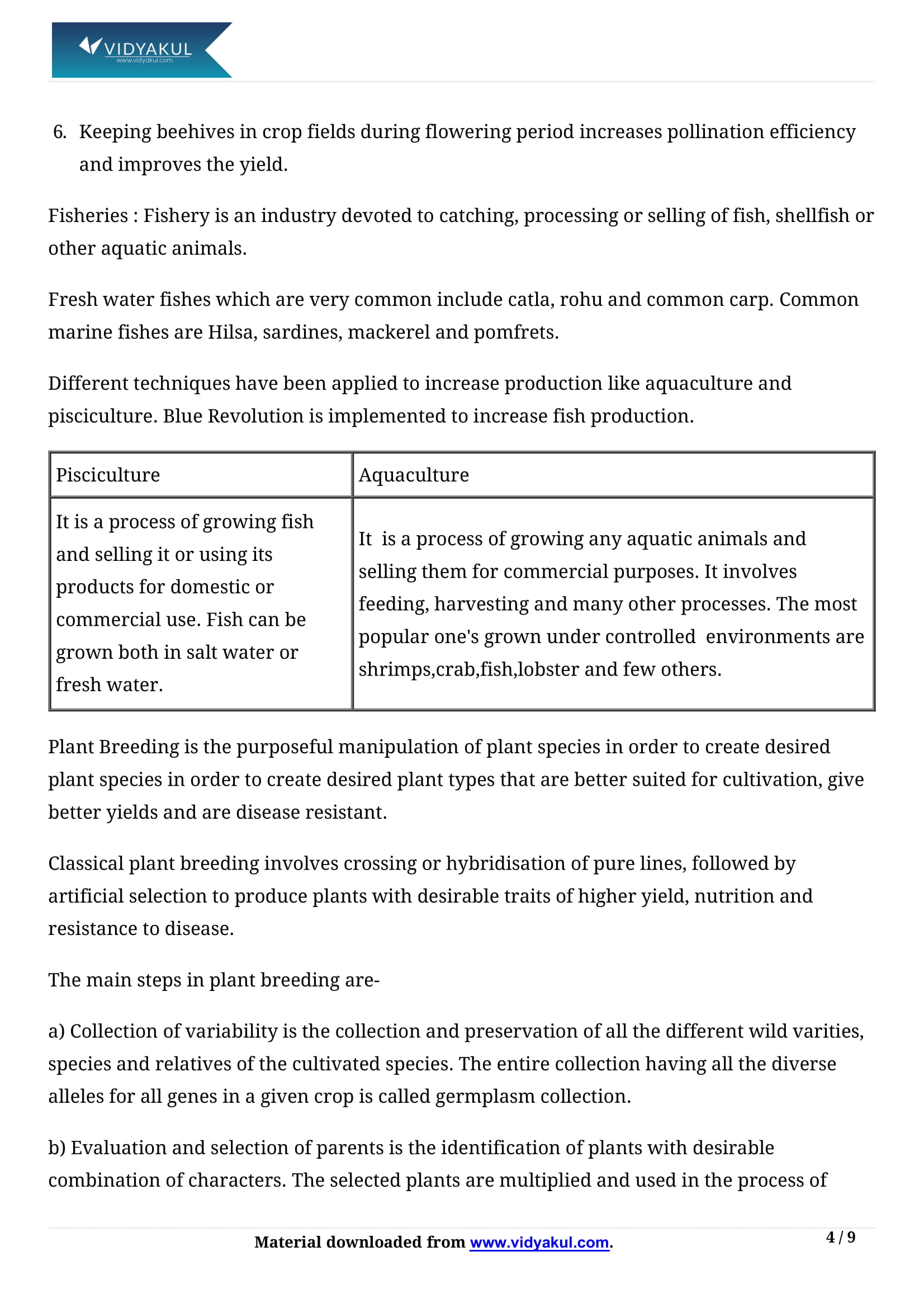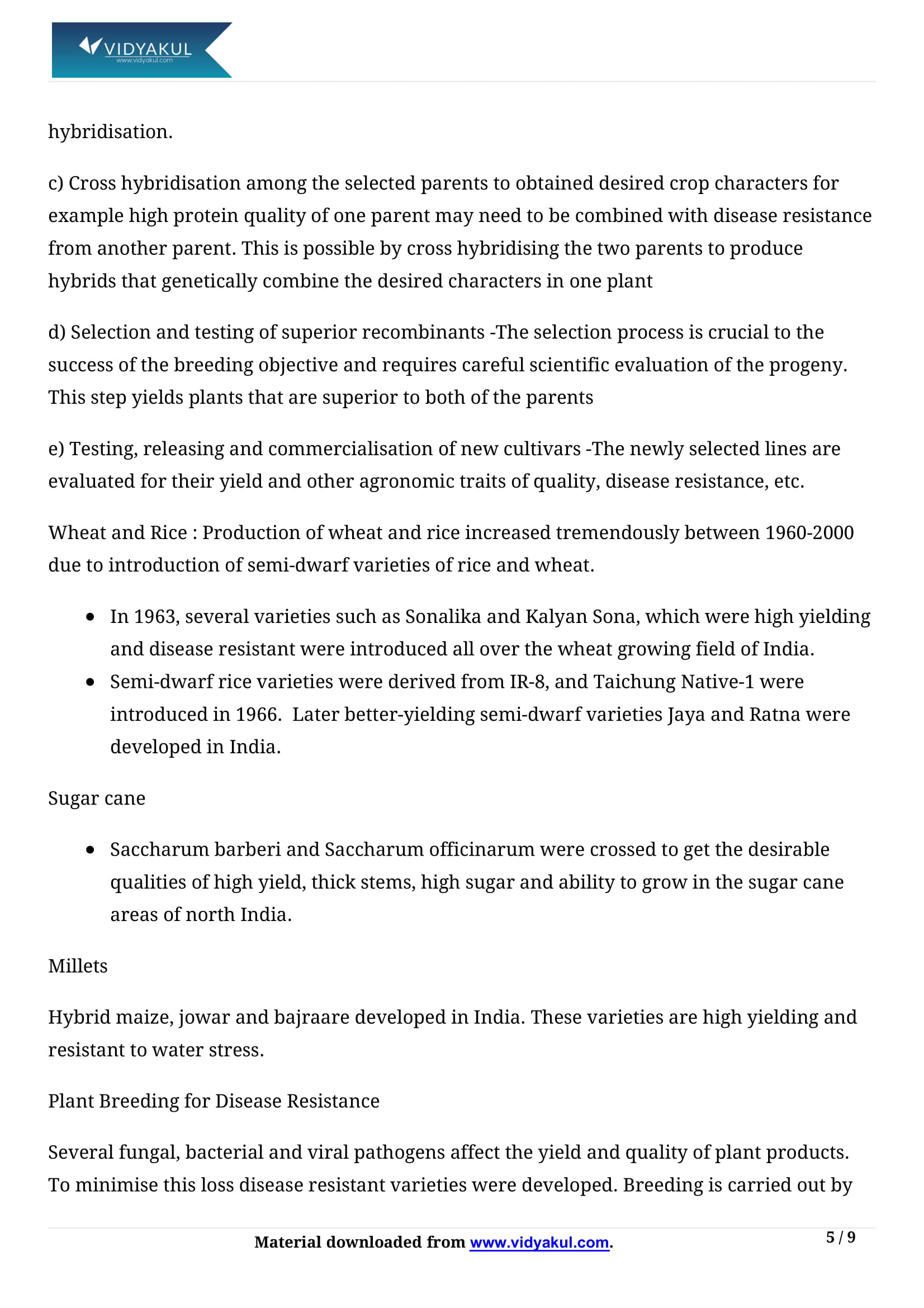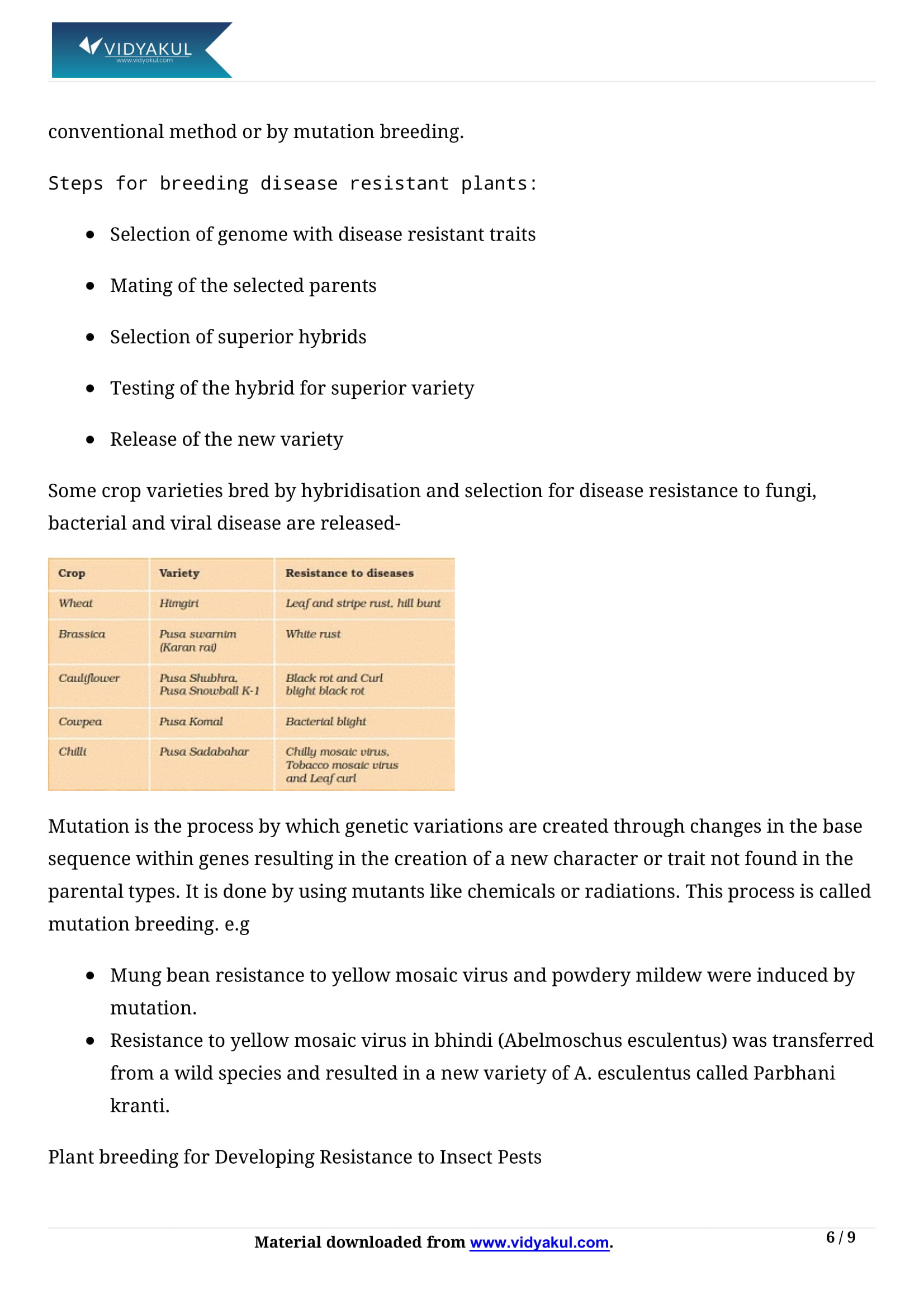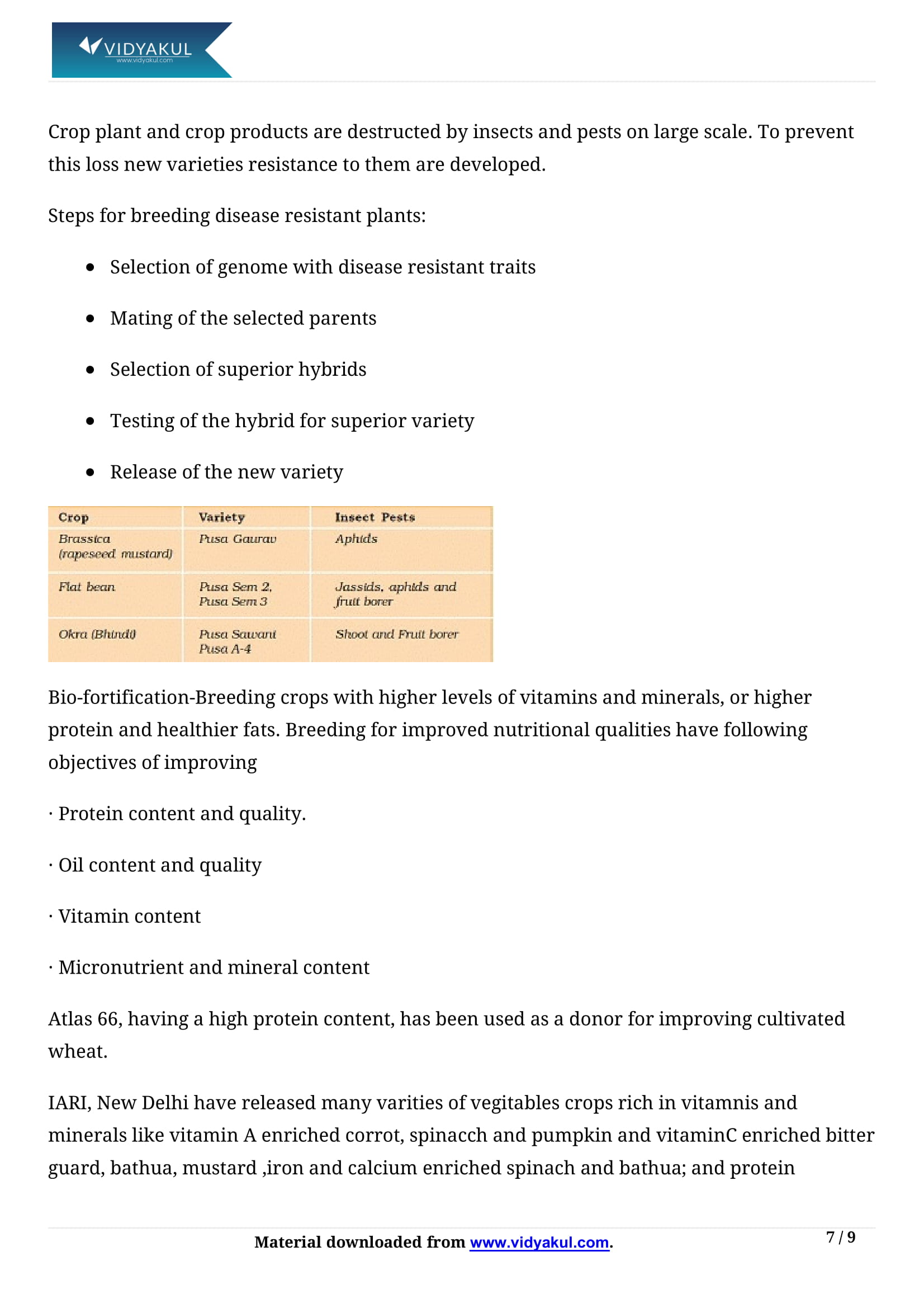Strategies for Enhancement in Food Production Class 12 Notes

Chapter 9 Strategies for Enhancement in Food Production
This chapter is based on the topic "Strategies for Improving Food Production". The Biology CBSE Class 12 helps students prepare for the entrance exam as well as the entrance medical exam. In this chapter, students explore animal husbandry, plant breeding, single-cell proteins, tissue culture, animal husbandry, and beekeeping. This set of notes in this chapter has been prepared by Vidyakul's group of experts who understand the exam templates and scoring system followed by the CBSE Board.
CBSE CLASS 12th BIOLOGY CH-9
Points to Remember
Below we have provided some of the important points that students must remember to score excellent marks in the upcoming exams:
We are dependent on plants and animals for our food. With an ever-increasing demand for food and animal products, the need to adopt scientific methods to enhance food production arose.
Animal husbandry means the breeding of livestock on a major level.
The main challenges are to increase productivity, decrease wastage due to pests, and find a solution for genetically modified crops.
Multiple Ovulation Embryo Transfer Technology (MOET) is used to improve animals such as cattle and sheep.
The target animal is given hormones that act similarly to Follicular Stimulating Hormone in the MOET technique (FSH). These hormones are responsible for follicular maturation and superovulation.
Transgenic animals are created through transgenesis, which involves the transfer of genes into special embryonic cells.
Many useful genes have been incorporated into transgenic animals to increase milk, wool, and so on, as well as to develop disease resistance.
Fishery is another thriving industry that is meeting the growing demand for fish and fish products due to their high protein content and omega-3 fatty acids.
Silk production is also a commercial aspect, and it is accomplished through sericulture, a silk production method that employs silkworms.
Topics and Sub-topics
All NCERT notes for Class 12 Biology Chapter 9 presented on this page are based on the latest CBSE labeling scheme. Therefore, students can use NCERT notes to prepare for exams and various competitive exams. Practicing the Vidyakul NCERT notes helps students build a strong foundation for competitive exams and perform well on final exams.
Students who find it difficult to understand the core concepts of this chapter can enhance their learning skills by referring to the Vidyakul NCERT videos as subject matter experts explain them.
The topics and sub-topics included in CBSE Class 12 Biology Chapter 9 are as follows:
Frequently Asked Questions
What are ‘Single cell proteins?
The proteins derived from the cells of microorganisms such as yeast, fungi, algae, and bacteria are known as single-cell proteins.
What is ‘Apiculture’?
Beekeeping or maintaining bee colonies is known as apiculture. It is also called the act of rearing honeybees.
What is ‘Biofortification’?
The process of increasing the micronutrient content of a food crop through selective breeding, genetic modification, or the use of enriched fertilizers is called ‘Biofortification’.
Practice Questions
What are the various steps that a Botanist will undertake to release a new variety of plants?
Why does a shift from grain to meat diets create more demand for cereals?
What is the name of this emerging area of research where a 250kg cow produces 200g of protein every day but 250g of Methylophillus methylotrophs can produce 25 tonnes of protein? State the advantages of this area of research.
In crop improvement programs, how are tissue culture methods beneficial over conventional methods of plant breeding?
How are mutations beneficial for plant breeding? Discuss with an example
Explain in brief the technology that made us self-sufficient in food production.
How is plant cell totipotency being used for plant propagation and improvement?
Explain the process of somatic hybridization.
We are dependent on plants and animals for our food. With an ever-increasing demand for food and animal products, the need to adopt scientific methods to enhance food production arose.
Animal husbandry means the breeding of livestock on a major level.
The main challenges are to increase productivity, decrease wastage due to pests, and find a solution for genetically modified crops.
Multiple Ovulation Embryo Transfer Technology (MOET) is used to improve animals such as cattle and sheep.
The target animal is given hormones that act similarly to Follicular Stimulating Hormone in the MOET technique (FSH). These hormones are responsible for follicular maturation and superovulation.
Transgenic animals are created through transgenesis, which involves the transfer of genes into special embryonic cells.
Many useful genes have been incorporated into transgenic animals to increase milk, wool, and so on, as well as to develop disease resistance.
Fishery is another thriving industry that is meeting the growing demand for fish and fish products due to their high protein content and omega-3 fatty acids.
Silk production is also a commercial aspect, and it is accomplished through sericulture, a silk production method that employs silkworms.
What are ‘Single cell proteins?
What is ‘Apiculture’?
What is ‘Biofortification’?
What are the various steps that a Botanist will undertake to release a new variety of plants?
Why does a shift from grain to meat diets create more demand for cereals?
What is the name of this emerging area of research where a 250kg cow produces 200g of protein every day but 250g of Methylophillus methylotrophs can produce 25 tonnes of protein? State the advantages of this area of research.
In crop improvement programs, how are tissue culture methods beneficial over conventional methods of plant breeding?
How are mutations beneficial for plant breeding? Discuss with an example
Explain in brief the technology that made us self-sufficient in food production.
How is plant cell totipotency being used for plant propagation and improvement?
Explain the process of somatic hybridization.
Learn more about the same in Strategies for Enhancement in Food Production Class 12 Notes pdf.
Download this solution for FREE Download this PDF











